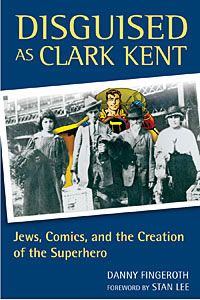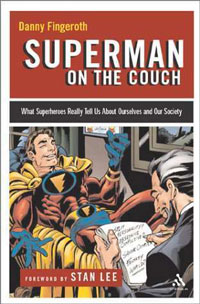Jews and the Creation of the Superhero
By Beth Davies-Stofka
October 8, 2009 - 13:13
Continuum
Writer(s): Danny Fingeroth; Stan Lee
ISBN: 978-0-8264-3014-4
Paperback, 216 pages, $19.95 US
 |
The stories of the births of our superheroes can sometimes feel a little dull. Or perhaps it's better to say that they've been told so many times that they suffer from sheer repetition. They start to feel like hagiography, or the Lives of the Saints.
One book really changed all that for me: Disguised as Clark Kent: Jews, Comics, and the Creation of the Superhero, by Danny Fingeroth. Fingeroth, a former editorial director of the Spider-Man comics, also wrote one of the finest interpretations of superheroes published to date, Superman on the Couch. While Superman on the Couch was concerned with the moral meaning of superheroes, Disguised as Clark Kent seeks to uncover the essentially Jewish character of these beloved icons.
Fingeroth follows a chronological timeline in Disguised as Clark Kent, starting with Genesis (Chapter 2), and following through to the Modern Age (chapter (9) and The Next Generation (Chapter 10). In each chapter, he recounts the "origin stories" of the heroes' creators, like Siegel and Shuster, Kane, Kirby, and Lee. We learn a little of how they grew up, what influenced them, who hired them, their working conditions, and the emergence of their greatest creations, like Superman, Batman, and The Spirit.
Fingeroth writes in a seamless and engaging style, and he tells these stories quickly, without becoming entangled in details. With the context established, he proceeds to offer perceptive interpretations of the deeper meanings of superheroes and their stories. Although his aim is to explore the Jewishness of these characters, it's easy to see that these stories belong to everyone, Jewish or not, because they have been shaped by many of the same forces that shape us all. American culture, in all its complexities, is at its heart a culture of immigrants.
Fingeroth's study of Captain America provides a good example. He finds a core Jewish metaphor, the metaphor of survival, at work in Stan Lee's 1964 reworking of Captain America. Discovered floating in the ocean by the Avengers (Avengers #4), Cap is revived. Fifteen years have passed. He has survived a WWII-era catastrophe, but it has left him in a time and place that is alien to him. He struggles to come to terms with a changed world, which he experiences as a refugee might. Cap has to reinvent himself to live in the world into which he has been thrust, alone and lonely.
 |
Even in the recent Civil War storyline, Captain America remained true to that unnamed something that is so essential to the Jewish experience. Whether conscious of it or not, Cap opposed the mandatory registration of superheroes just as he might have battled Hitler's mandatory registration of Jews. This was an act of moral sacrifice that forced the ultimate price from Cap. To me, the parallels were unmistakable, and Fingeroth lays it on the line with simple eloquence.
If you're not reading Fingeroth, I'd suggest wasting no time asking your local comics retailer to order Disguised as Clark Kent and Superman on the Couch. These are slim volumes, well-written, enjoyable to read. They will open your eyes to how truly wondrous superhero stories can be.
And I have a tip for you, a secret that others may not know. In his writing, Fingeroth is very generous with his experience and insights. He was recently named Senior Vice-President of Education for the Museum of Comics and Cartoon Art in New York, and his class in comics writing begins October 20. You may not be able to afford to travel to New York and take his class. But Disguised as Clark Kent, like Superman on the Couch before it, is not only a book, but a Master Class in comic book writing. At $19.95, it's ridiculously cheap for what it can offer to the aspiring comics writer. Don't miss this chance to learn all you can! It's a wonderful reason to read.
Rating: 8.5/10
Related Articles:
Superman 2025 Movie Review
DC Classic Multiverse Superman and Page Puncher Superman Review
Le langage kryptonien de Superman dans le film Man of Steel : une analyse de la théorie des médiums
Retro Review: Superman (1988)
That Time Canada Claimed Superman for Stamps Collectors
First Appearance Superman Action Figure (2004)
So Superman Is Bisexual?
Review: Superman: Up in the Sky #2
Review: Superman’s Pal, Jimmy Olsen #1
Review: Superman #13
